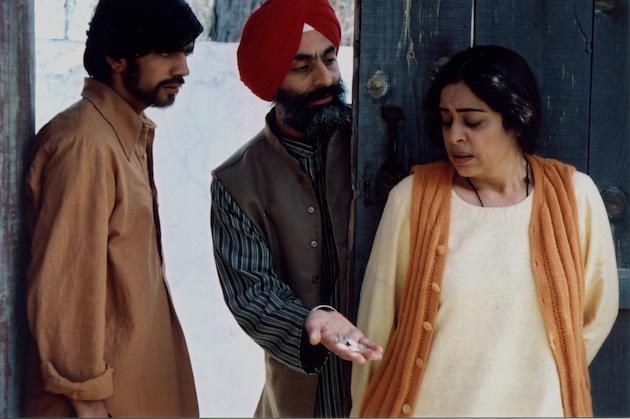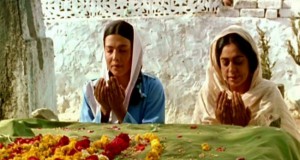
We are all familiar with the inner workings of a community. No matter how isolated our lives become in urban, nuclear family set-ups, or how valuable our independence and anonymity in society, we tend to fall back on a group of people who make us feel like we belong – our community. The roles we adopt within the group give it stability and, in turn, the group gives us a sense of security.But what happens to individuals when their community is faced with forces larger than itself? Who fights, who flees and who flows with the tide? Branching off from the community, with all the comforts that it offers, can become a true test of character. This year marks the 70th anniversary of the Partition of India – a significant chapter in our history when millions of people were faced with this dilemma.
As the relationship between the two nations hits new lows, it is only apt to look at a film about the Partition that is a collaboration of creatives from across the world. Khamosh Pani or Silent Waters (2003) is an award winning, French-German-Pakistani co-production directed by Sabiha Sumar, with Indian actors Kirron Kher and Shilpa Shukla, and script by Paromita Vohra.
We meet our characters in 1979, just before Pakistani Prime Minister Zulfikar Ali Bhutto is hanged, and General Zia-ul-Haq assumes control of Pakistan. The story is set in Charkhi, a quaint little village near Rawalpindi, Pakistan, where people live a sweet life full of friendly cheer and camaraderie.
Ayesha (played by Kirron Kher), a widow who teaches the Quran to young girls to support herself, is a part of Charkhi’s close-knit and relatively progressive community. Her son, Saleem, is a sensitive and somewhat misguided teenager. Saleem is in love with Zubeida (Shilpa Shukla), a beautiful young ambitious girl who is still in school. Ayesha is fond of Zubeida, and her approval of their union is apparent to both Saleem and Zubeida.

Charkhi’s world is one where women support each other. They move around public spaces with relative ease. They are as involved and respected in the community as the men. Ayesha and her good friend Shabbo spend a lot of time together doing household chores, helping each other out in time of need. Life flows along gently, much like the river that meanders through Charkhi. This seemingly good life feels even better when juxtaposed with Ayesha’s haunting memories of the Partition. The mayhem and carnage she remembers appear to be in stark contrast to her present situation – the foundation of this peaceful community laid by those who came from elsewhere, silently carrying with them the horrors of the past.
The idyllic life is disturbed by two men who arrive from Lahore, bringing with them a wave of Zia-ul-Haq’s religious extremism that has begun to flow across the country. Winds of change are ignored at first, even made fun of, as the people of Charkhi feel that politics is none of their business. Despite being able to see through the two men’s true intentions, people are soon forced to give in to threats of grave consequences if they refuse to follow Zia’s message of ‘true Islam’. Saleem too makes fun of the men from Lahore at first, but is not strong enough to resist the temptation of a ‘higher purpose’ and the prospect of becoming a respectable man with a meaningful life. As Ayesha feels Saleem slipping away, she asks her friend Shabbo – “Who can we call our own if not our children?”
Suspicions and moral judgements appear through the cracks due to fear-mongering. This handful of loud and aggressive men, including Saleem, spread their message of hate and submission, building higher walls around the girls’ school, and shutting businesses at prayer time. The easy intermingling and intimate relationships that once defined the life of Charkhi are no more. Saleem now looks at Zubeida’s love for him with disgust. Ayesha cannot believe that her son has gone down the path of religious dogmatism while she herself teaches young girls about a benevolent Allah who loves one and all.
Ayesha’s flashbacks continue. Her recurring nightmare is brought to the fore by Jaswant, a man who is visiting Charkhi with a group of other Sikh pilgrims from India. Jaswant goes around the village asking uncomfortable questions about women who were left behind at the time of Partition. Despite warnings from his friends, Jaswant insists on finding information about one woman in particular, his sister Veero, who had escaped a mass murder orchestrated by their father for all the women in their family. Amongst the many horrific tales from 1947, the most heart wrenching are the countless stories of communities that murdered the women in their families for the sake of family ‘honour’. Women are the most vulnerable in times of violent conflict, not just as humans, but as the possessors of a uterus. Rape becomes a frequently-used weapon with which men attempt to take control of the enemy, for the ‘honour’ of a people seems to rest in ‘their’ women’s duty to have sex only with a man approved by her family and bear ‘his’ children. The women who survive sexual violence have no better fate than the ones who are killed, as they are considered ‘polluted’ and seldom taken back into their own families.
It turns out that Ayesha, Veero at the time, had escaped when her father was leading all the women of the village into a well. Veero was caught by some men who took her by force. She was lucky to find a kind man amongst them who protected her, looked after her and eventually decided to marry her. Veero converted to Islam and settled into her new life in her old family home as Ayesha.
Jaswant tracks down Ayesha and confronts her about her past. Her brother stands in front of her, asking her to return home and see their father who is on his deathbed. Ayesha’s world is turned upside down. Saleem, afraid of his own status as the son of a potential ‘infidel’, pleads with Ayesha to stand in front of the village and state her religious beliefs. Ayesha responds with a heavy silence. As a result, Ayesha is subjected to much shame and embarrassment in the community, and ostracized from village life, even by her close friends.
Isolated and helpless, we see Ayesha going to the well to collect water, something that her friends used to do for her in the past. She had stayed away from the well for many years, probably because of her traumatic memories associated with it. Here she meets Jaswant who pleads with her to come back with him to see their father so he can die in peace. “He wanted to kill me for his peace. What will he do if he sees me alive, and a Muslim at that? How will he go to his Sikh heaven? And what heaven is there for me? A Sikh heaven or a Muslim heaven?” Ayesha retorts. Zubeida is witness to this conversation, and seems to be the only one who understands Ayesha’s plight. Both of them, having lost Saleem to fundamentalism, find momentary solace in each other.
The fabric of a community dictates how individuals thread their lives together. Veero held on to the thread of her life as Ayesha all these years with the hope that she would once again be a part of a community. As time goes by, it is clear that for anyone to be publicly associated with her, an ‘infidel’, will be dangerous. One early morning, after Saleem does not return home all night, Ayesha heads to the well. Alone and heartbroken, shunned by everyone she has ever called her own, she stands at the edge of the well and jumps in.
Saleem opens a trunk and finds proof of Ayesha’s previous life as Veero, with Sikh religious texts and photographs. He adds to that Ayesha’s Quran and other belongings, neatly spreading them out, and closing the trunk. The trunk that contained all of Ayesha and Veero is quietly let go off into the river by Saleem, so as to erase his mother completely. Zubeida watches him from afar, the only witness yet again. Saleem gives her Ayesha’s last possession, a locket with a photo of young Veero and a gold chain.
The film ends in Rawalpindi city, two decades after Ayesha’s demise. We see Zubeida living in a modern apartment, getting dressed (wearing Ayesha’s chain and locket) and heading to work. She still dreams of Ayesha, keeping her alive in her memories. We see Saleem on the TV screen as a seasoned politician – Saleem Khan, General Secretary. He is still harping on the same fundamentalist ideals, but this time, more articulate and extreme.
For me, ‘Silent Waters’ is an evocative, tender tale about the lives of two women, and how they unfolded in response to a complex train of events spurred on by the Partition. The protagonist Ayesha/Veero, a woman with great survival instincts, adapted to her surroundings until the odds lined up against her. She managed to rebuild her life once (at the time of Partition), but refused to do it again. Zubeida represents the next generation, with greater strength and determination to carry on the fight. Moving to the city would not have been easy, but Zubeida, silent and steadfast, seems to have created a space for herself and held on to her dreams.
While we see history often reduced to a recreational activity of those in power, it is imperative that personal stories from the Partition continue to be watched and heard, and more importantly, narrated. The value of this film lies in not just its historical significance, but in the way women control the narrative, making it both poignant and powerful.